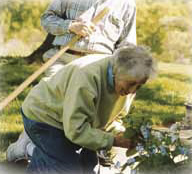To read or print the COLLAGE program overview brochure (pdf), click here
Are you committed to:
- Targeting health and wellness programs to match resident needs?
- Empowering your residents and staff to make aging in place decisions?
- Benchmarking your community health and wellness data with data from your peer group?
- Promoting efficiencies in the use of community resources?
- Using data to inform resident service plan development?
 Initial success in using data to drive good decisions has been demonstrated within many of the communities participating in COLLAGE. As an example, Alexian Village of Milwaukee embraced the concept of using empirical data to support “doing the right things.” Initial analysis encouraged the organization to focus on memory loss, pain, and depression in their residents. Ensuing adjustments and interventions resulted in increased resident satisfaction, and a significant reduction in healthcare services and the attendant costs.
Initial success in using data to drive good decisions has been demonstrated within many of the communities participating in COLLAGE. As an example, Alexian Village of Milwaukee embraced the concept of using empirical data to support “doing the right things.” Initial analysis encouraged the organization to focus on memory loss, pain, and depression in their residents. Ensuing adjustments and interventions resulted in increased resident satisfaction, and a significant reduction in healthcare services and the attendant costs.
For Individuals
 Health and wellness information is gathered from clients through a voluntary one-on-one conversation with a qualified staff person using the computerized COLLAGE assessment tool. Questions focus on residents’ interests, needs, experiences, preferences and challenges. If the staff person and resident identify an area or theme that is particularly challenging—such as nutrition, sleep, exercise or preventive health maintenance—together they develop an individualized plan for addressing it. The COLLAGE conversation offers an opportunity to collaborate with clients and better plan for their future, potentially enriching their lives, both within and outside the community. Information gathered during the assessment conversation is entered into the COLLAGE software by staff, either as the conversation proceeds, or at its conclusion.
Health and wellness information is gathered from clients through a voluntary one-on-one conversation with a qualified staff person using the computerized COLLAGE assessment tool. Questions focus on residents’ interests, needs, experiences, preferences and challenges. If the staff person and resident identify an area or theme that is particularly challenging—such as nutrition, sleep, exercise or preventive health maintenance—together they develop an individualized plan for addressing it. The COLLAGE conversation offers an opportunity to collaborate with clients and better plan for their future, potentially enriching their lives, both within and outside the community. Information gathered during the assessment conversation is entered into the COLLAGE software by staff, either as the conversation proceeds, or at its conclusion.
For Organizations
 For a campus or community, COLLAGE helps identify residents who need assistance in areas such as medication and pain management; health screening and making appointments; shower safety; vision or hearing testing; loneliness, depression and memory loss; nutrition; managing housework; and chronic fatigue. With a deeper knowledge of clients’ needs and interests in the aggregate, communities are better positioned to develop programs and services to improve quality of life on a larger scale.
For a campus or community, COLLAGE helps identify residents who need assistance in areas such as medication and pain management; health screening and making appointments; shower safety; vision or hearing testing; loneliness, depression and memory loss; nutrition; managing housework; and chronic fatigue. With a deeper knowledge of clients’ needs and interests in the aggregate, communities are better positioned to develop programs and services to improve quality of life on a larger scale.
National Data Repository
Assessment information is transmitted to the COLLAGE national data repository housed at the Institute for Aging Research at Hebrew SeniorLife in Boston. Repository reports, based on the assessment data, are provided to all consortium members and offer aggregate comparisons:
- consortium member-to-member
- campus-to-campus or residence-to-residence within a multi-site organization, and
- member-to-comparison group (data sets of persons living in the general community)
The repository is another window into performance, benchmarking, and quality improvement.
What is COLLAGE, The Art & Science of Healthy Aging®?
 COLLAGE, The Art & Science of Healthy Aging® was created in 2005 as a joint venture between Kendal Outreach, LLC, a not-for-profit subsidiary of The Kendal Corporation, and the Institute for Aging Research at Hebrew SeniorLife, a not-for-profit organization affiliated with Harvard Medical School. COLLAGE is a customized suite of standardized and systematic assessment instruments that evaluate health and wellness in areas such as memory loss, nutrition, balance and mental well-being. The information is collected in a national repository and disseminated to a consortium network consisting of continuing care retirement communities (CCRCs), congregate senior housing sites, both market rate and subsidized, and senior service agencies. COLLAGE reports are provided to the COLLAGE membership on two platforms: individual resident assessment and organizational performance assessment of individual housing sites or service centers that seek effective interventions, preventive programs and focused services.
COLLAGE, The Art & Science of Healthy Aging® was created in 2005 as a joint venture between Kendal Outreach, LLC, a not-for-profit subsidiary of The Kendal Corporation, and the Institute for Aging Research at Hebrew SeniorLife, a not-for-profit organization affiliated with Harvard Medical School. COLLAGE is a customized suite of standardized and systematic assessment instruments that evaluate health and wellness in areas such as memory loss, nutrition, balance and mental well-being. The information is collected in a national repository and disseminated to a consortium network consisting of continuing care retirement communities (CCRCs), congregate senior housing sites, both market rate and subsidized, and senior service agencies. COLLAGE reports are provided to the COLLAGE membership on two platforms: individual resident assessment and organizational performance assessment of individual housing sites or service centers that seek effective interventions, preventive programs and focused services.
The collected and analyzed data provide a framework to incorporate ongoing, systematic, and integrated assessment practices combined with evidence-based interventions in order to improve:
- the ability of older adults to remain independent
- the overall quality, consistency, and continuity of health services across all levels of care
- the effectiveness of programs and services, and
- organizations’ ability to plan for the changing needs of older adults.
Demonstrated Benefits
- Improves continuity and planning across the continuum of services
- Provides individual residents with customized information and a wellness roadmap to manage their own health
- Identifies needed services to maximize abilities and functions in older adults
- Evaluates and influences the systems of services and care
- Helps an organization emphasize health promotion and adaptation
- Facilitates informed data-based choices about risk and service decisions
- Improves individualized service plans and organizational performance through data
- Captures health and social information of an older population in aggregate housing to evaluate the effects of “aging in place”
COLLAGE, The Art & Science of Healthy Aging® brings together pioneering organizations committed to being on the leading edge of introducing new standards of quality and technology.